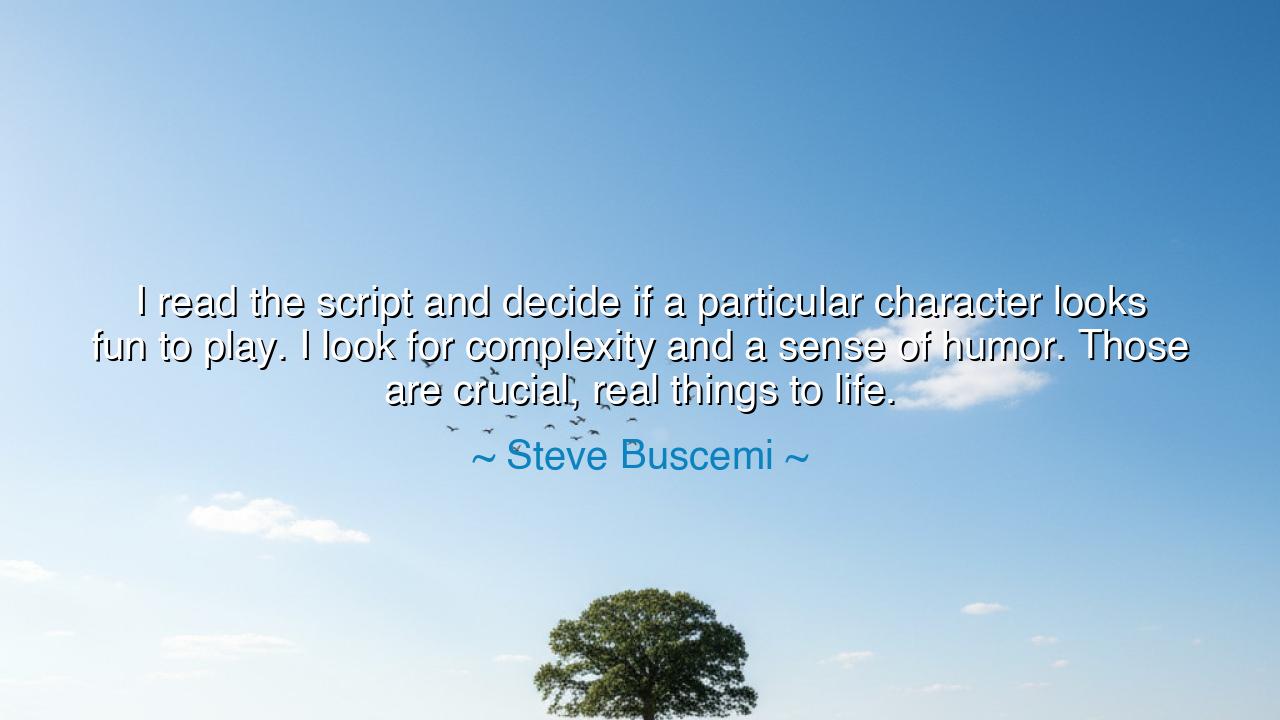
I read the script and decide if a particular character looks fun
I read the script and decide if a particular character looks fun to play. I look for complexity and a sense of humor. Those are crucial, real things to life.






The words of Steve Buscemi ring with quiet wisdom, born of a life spent studying both the masks and the faces beneath them: “I read the script and decide if a particular character looks fun to play. I look for complexity and a sense of humor. Those are crucial, real things to life.” Though spoken in the language of an actor, these words transcend the stage and reach into the very essence of existence. For in every human life, there is a script — the choices we make, the roles we play, the stories we tell — and in that grand performance, complexity and humor are the twin lights that reveal our humanity.
In speaking of complexity, Buscemi touches upon one of life’s most profound truths: that the human spirit is not simple, nor should it ever be. The great characters of literature, history, and flesh alike are those whose depths defy easy understanding. To seek complexity is to seek truth, for truth is rarely clean or convenient. The ancients knew this well — that the hero is not perfect, but divided; not pure, but striving. Odysseus, clever and flawed, was as deceitful as he was brave, and it was this contradiction that made him real. Likewise, Buscemi reminds us that the most interesting characters — whether on screen or in life — are not those who fit expectations, but those who reflect the tangled beauty of being human.
Yet Buscemi adds a second and equal measure: a sense of humor. In this, he reveals a deeper understanding of art and of life itself. For without humor, even the most complex story turns heavy and lifeless. Humor is not merely laughter; it is perspective. It is the ability to look at tragedy and still find light. It is the sacred art of survival through joy. The Stoics of old taught that one cannot control fate, but one can control how one meets it — and humor, in its finest form, is that very act of mastery. It allows us to stand before sorrow and say, “I am still alive. I can still laugh.” Thus, when Buscemi seeks humor in a role, he is seeking life — the breath that animates the soul within the script.
Complexity without humor is despair; humor without complexity is emptiness. But when the two meet, the result is truth — not the shallow truth of logic, but the living truth of emotion. Consider Charlie Chaplin, the silent poet of cinema. His “Little Tramp” was both comic and tragic — a clown and a philosopher, a fool and a saint. In his laughter, we saw hunger; in his tears, we found hope. Chaplin understood, as Buscemi does, that the heart of great storytelling — and indeed of great living — lies in this balance. To portray only pain is cruelty; to portray only joy is falsehood. But to weave the two together — that is art, and that is life.
Buscemi’s reflection also speaks to the origin of his craft, born from the streets of New York, where ordinary people carry extraordinary stories. There, complexity is a daily companion — the kindness of a stranger mixed with the sharpness of survival, the humor of hardship shared over a cup of coffee. He learned early that people laugh not because life is easy, but because it isn’t. His characters, whether saints or sinners, live by this truth — that laughter and pain are not opposites but partners. Through them, Buscemi honors the human experience as something messy, contradictory, and deeply beautiful.
The lesson, then, is not reserved for actors alone. It is for every soul that walks the stage of the world. When you choose your own “roles” in life — the work you do, the people you keep, the stories you tell — seek complexity over comfort. Do not fear contradiction; embrace it, for it is the mark of growth. And seek always the humor that softens the weight of living. When you can laugh at your own failings, you have mastered them. When you can find joy even in difficulty, you have touched the divine.
And so, dear listener, remember Steve Buscemi’s quiet truth: that what gives life its richness is not perfection, but complexity, and what gives it its light is humor. Be curious, be layered, be imperfect. Let your heart hold contradictions — courage and fear, sorrow and laughter, tenderness and strength. For these are not opposites but harmonies, the chords of a soul fully alive. And above all, learn to laugh — not to escape life, but to embrace it more completely. For as long as there is laughter, there is light; and where there is light, there is the fullness of what it means to be human.






AAdministratorAdministrator
Welcome, honored guests. Please leave a comment, we will respond soon